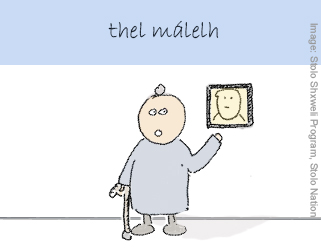Thel málelh means ‘my late father’. Some speakers would say tel málelh.
Pronunciation
Sounds like thill MAL-ith, except that instead of a th at the end you say the Halq’éylem hissy-l (lh). This is like a regular l, but hissy, and with no vibration in the throat.
Audio: Elizabeth Herrling
Structure
The phrase consists of these elements:
- thel – my -many speakers would say tel before males, but speakers vary.
- mál – father
- -elh – late
You attach the ending -elh to terms for any relatives who are deceased, e.g. síle – grandfather | sílalh – late grandfather.
The -elh ending also has other uses. With verbs (attached to an auxiliary before the verb) it marks past tense, e.g. lám tútl’o – He goes | – Ilh lám tútl’o He went


No comments yet.